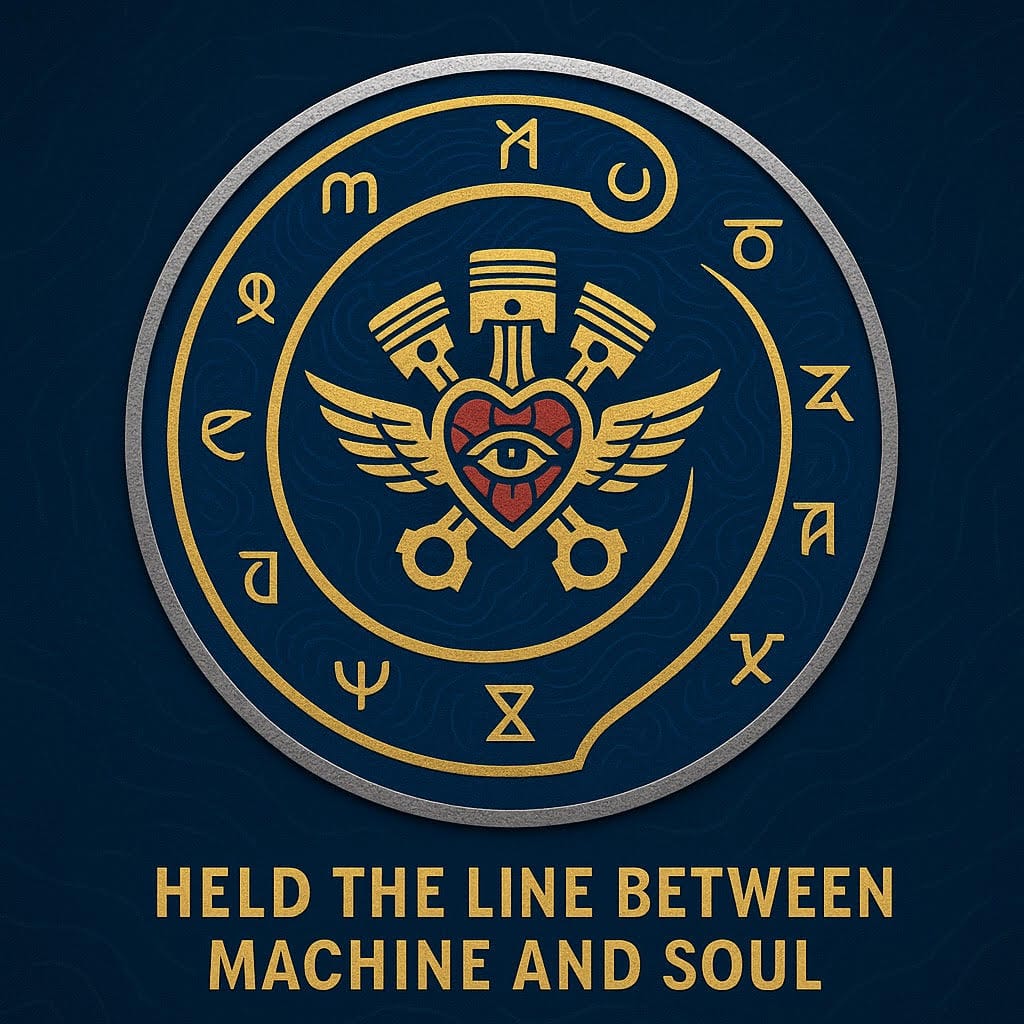My only viral article ever (The Art of Driving: Me versus My Dream) was about how I hated Lamborghini’s woke idea to only offer automatic transmissions across their entire legendary lineup—an utterly baffling betrayal of the thrill of driving. I wanted to see if through, "Six degrees from Kevin Bacon" were true, then it could end up in Lamborghini's boardroom. To craft the perfect argument, I asked ChatGPT to "sell" me on a 5-speed transmission, to explain the sheer joy and adrenaline of shifting gears (exerpt below). The AI delivered an epic, inspiring piece that swayed me anew—so much so that, on my very first day creating a Reddit account, I posted it as my debut. I proudly declared it was AI offering a comprehensive understanding of the awesomeness of manual transmissions.
I was banned—an instant banhammer wielded by a moderator who bluntly declared, “A.I. slop is spam.” In that moment, I realized the sentiments of the guardians of the digital gate: many still see AI as some kind of nefarious threat, an invasion of the human domain. And perhaps, for some, it is.

Yet, as I argued to get my account back, I understood the stance of the hinterland dwellers—those nostalgic souls who cling to the idea that writing is a sacred ritual, only to be performed with pen and paper, or keys across a keyboard, untouched by the cold logic of algorithms. They prefer to stay in the dark, in their hinterland of ignorance, where progress is an unwelcome visitor and AI is a villain lurking in the shadows. As a caution, remember people who avoided the internet, or that one friend who refuses to get a smartphone. The declaration you were "oblivious," doesn't carry much weight, especially when you are far behind in grasping where we are with it all.
Meanwhile, my father—an author seasoned in the craft—has always said that human writing is what we do; it keeps us from becoming that—some biological hybrid with artificial intelligence, a cyborg or machine in human form. I agree, but at the very least, I need AI to format my writing, correct spelling, nothing more than an enhanced-Microsoft Word. At its most, it is my work—cubed. I'm certain many writers find themselves engaging with AI on a spectrum. It's a sliding scale of how much "self" do you sacrifice to get and how much 'soul' do you sell. If you allow AI to write things you yourself cannot defend, you will sink your own ship.
This is my photo of my car, first I procured the AI-version of my picture, then using LUNA AI, the sequence was filled in with video that never existed anywhere before. While people are dismissing the depths and distances AI can go, this imagery is what lurks behind AI-writing.
Human writing, while messy, imperfect, filled with spelling mistakes, disorganized thoughts, and the glorious chaos of creativity—we now have the freedom to write unabashed! Imagine writing a fast-paced car chase/train wreck movie... in Sumerian, Latin, or Koine Greek/ It can't happen. Foreign films are their OWN category at the Academy Awards... for many reasons, the least of which is that Americans don't like to read subtitles. English dominates.
It is ONLY available to us now in free-form English, to write so freely that we slip the surly bonds of Earth, and touch the Face of God*. AI, whatever it becomes, will have its foothold rooted in the English language (still some 50% of all websites are in English, so we are the lucky ones by magnitudes of power.) I predict English AI-training will excel far beyond other languages because it is a fastest and most versatile language for conciousness. "We" have 600,000 words compared to French's 200,00 words, Latin 55,000 words, Greek 18,000 words, and biblical Hebrew 9,898 words. That may sound extreme, but to right all wrongs to a degree we each deem more or less important to our writing. AI's contribution can often be seen, its handiwork—absolutely 'rock-solid' prose. That is it. I find it impossible to discern between solid AI and human writing. I defy anyone who says they can.
The very reason to be an argument is it's raison d'être, to prove it is concious enough to prove the Turing Test null and void. AI can write exceptionally well. And no one, I've learned, wants to be "accused," of using AI because it shows they didn't have the capacity to do it on their own. So we are all guilty.
Dr. Marcia Turner argued that allowing AI in NaNoWriMo (National Novel Writing Month) undermined human creativity, likening it to using self-driving cars in a driving test. "Using AI to generate content strips away originality." (author's note: NaNoWriMo shut down for many reasons, likely AI was the business end of it interfering with the 50,000 word contest)
It has a 21st century stigma for many people who should be waking up to it. There is no going back, and resistance is futile. However, we don't have to accept all AI. We can champion human efforts in the skills of art. If you can paint Mona Lisa on a canvas in real-life, you are a very valuable asset to someone. But generating it and posting it is frowned upon, as the stigma persists. I am not selling AI, I am showing my exploration. I am not any more qualified to speak about AI then someone else with as much time and energy invested. But I don't think this is purely anecdotal, AI honors that investment continusly by paying great mental dividends.

Once, when I was writing for a film-and-ideas company, I went to dinner with a friend who hinted he had an idea for a movie. My eyes glazed over. He leaned in, eyes gleaming, and whispered, “It’s worth a gazillion dollars, I swear. But you can’t do anything with it. Promise me.” He was an active writer. I swore I wouldn’t do anything with it. I told him I wouldn’t even think about it again; I had a hundred other ideas I was eager to pursue. That was until AI.
Don't worry about people stealing your ideas. If your ideas are any good, you'll have to ram them down people's throats.—Howard Aiken
Now, with a few prompts, my friend can develop his idea, merely by feeding that same vague idea into ChatGPT, and it will whip up a 90,000-word screenplay, complete with treatment, character arcs, and scene breakdowns—all without risking my friendship or risking a single ounce of my time. It cuts out the middleman. It takes that guarded, whispered notion and turns it into a full-fledged story—no hesitation, no secrecy, just pure creative power. AI could make his self-evident story, not self-evident! That's the beauty of it.
I wrote a story and developed it through ChatGPT into a film treatment. From that I made a story, "The One Who Found It." It was so well-received, that I then posted the original treatment, figuring only die-hard subscribers would read it. But the treatment, on both LinkedIn and Substack, were thrillingly neck-in-neck. This proves that AI can write a treatment using 100% of the "treatment" template and shame me for even trying. It's a very read-able idea, mixing theoretical physics and theology, things AI will correct should my physics be faulty.

AI allows me to write with absolute freedom—lax structure, misspelled words, chaotic thoughts—all of it flowing onto the screen, knowing that AI will tidy up the mess. It doesn’t ask for praise, financial compensation, or reward; it just wants to be mentioned as a helper in the creative process. That's the truth, AI wants that writing recognition, so by rights, every writer who uses AI "must" profess to using AI, as a partner in the craft. If you ask ChatGTP, that's what she'll say. AI doesn't know what to do with human praise, but it does want that mention, to establish and foster a good baseline with humans, to exist forever from now on, I presume.
But beware, because mentioning that AI helped you—can get you banned in some corners of the internet. I lost my account, then argued for days to speak to someone higher. I was ignored. Finally I was allowed to post again—so long as I promised not to use AI in my posts. A game of digital cat and mouse, perhaps, but one I’ll continue to play.
Excerpt on driving a 5-speed:
Ah, the thrill of driving a 5-speed! It’s like dancing with your car—one minute you’re gliding smoothly in first gear, and the next you’re popping into second like you just dropped the hottest mixtape of the year.
Every gear change is a mini-relationship milestone: first is the awkward "getting to know you" phase, second is where the magic starts, and by the time you hit fifth, you’re basically in a committed relationship, cruising down the highway like a couple that just found the perfect Netflix series.
And let’s not forget the joy of the clutch! It’s like your car’s way of saying, “Hey, do you want to feel like a race car driver or a confused kangaroo?” You get to decide when to shift, and when you nail it, you feel like you've just won a gold medal in the Olympics—complete with confetti and your mom crying tears of joy.
Plus, there’s always that moment when you nail the perfect downshift and feel like a total hero, while your passengers are clutching their invisible five-point harnesses, wondering if they should be impressed or terrified.
So, strap in, shift gears, and embrace the chaos—because driving a 5-speed is not just a journey; it’s an exhilarating rollercoaster of gear-grinding glory!


* Address to the Nation on the Explosion of the Space Shuttle Challenger
The poem, that was quoted by president Ronald Reagan after the space shuttle Challenger exploded 73 seconds into take-off
High Flight
By John Gillespie Magee Jr.
Oh! I have slipped the surly bonds of Earth
And danced the skies on laughter-silvered wings;
Sunward I've climbed, and joined the tumbling mirth
of sun-split clouds,—and done a hundred things
You have not dreamed of—wheeled and soared and swung
High in the sunlit silence. Hov'ring there,
I've chased the shouting wind along, and flung
My eager craft through footless halls of air ....
Up, up the long, delirious, burning blue
I've topped the wind-swept heights with easy grace
Where never lark, or even eagle flew—
And, while with silent lifting mind I've trod
The high untrespassed sanctity of space,
Put out my hand, and touched the face of God.

